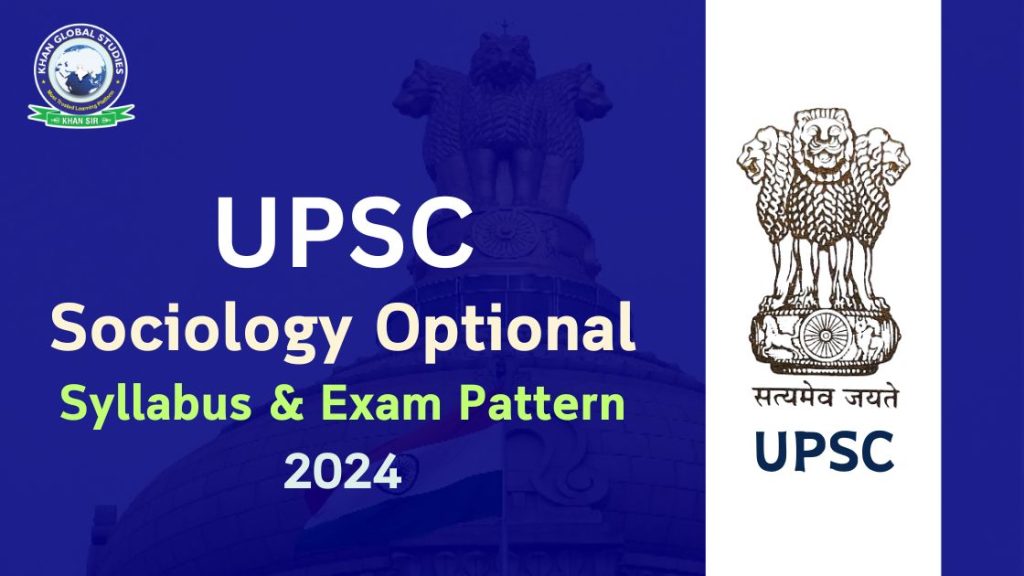It takes a lot of time to clear the UPSC Civil Services Examination. In UPSC preparation, Sociology subject is important for the candidates who have chosen it as optional in Mains. To score best in optional, candidates should understand Sociology well, so in this blog, we will discuss the Sociology Optional syllabus for UPSC.
What is UPSC?
UPSC conducts the Civil Services Examination (CSE). UPSC recruits candidates both in civil services as well as defence services. The recruitment examination for the post of Indian Administrative Service (IAS) officer is conducted every year by the Union Public Service Commission.
What is the importance of Sociology as an optional subject in UPSC?
If candidates choose a Sociology subject as an optional subject in the UPSC Mains exam, then candidates have to appear for a Sociology paper. The main examination consists of two qualifying papers in Sociology. Candidates have to qualify for both papers. The Sociology syllabus overlaps with GS Paper 1 (Indian Society section) in the main examination and helps prepare for GS 2, GS 3 and Essay papers.
Sociology Optional Syllabus for UPSC
Before passing any exam, it is important to know its syllabus. Sociology is an optional subject at UPSC. Therefore the candidate should know the complete syllabus before preparing for it. The Sociology Optional Syllabus for UPSC is explained in detail.
Sociology Optional Paper 1 Syllabus for UPSC Mains
The Sociology optional syllabus for UPSC for Paper 1 in UPSC Mains is as follows:
| FUNDAMENTALS OF SOCIOLOGY | SYLLABUS |
| Sociology – Discipline (समाजशास्त्र – अनुशासन) | The social organization of work in different types of societies – slave societies, feudal societies, industrial, capitalist societies, a formal and informal organization of work, labor and society. |
| Sociology as a Science (एक विज्ञान के रूप में समाजशास्त्र) | Science, scientific method and criticism, major theoretical aspects of research methodology, positivism and its criticism, fact value and objectivity, and non-positivist methods. |
| Research Methods and Analysis (अनुसंधान के तरीके और विश्लेषण) | Qualitative and quantitative methods, techniques of data collection, variables, sampling, hypotheses, reliability and validity. |
| Sociological Thinker (समाजशास्त्रीय चिंतक) | Karl Marx – Historical materialism, mode of production, alienation, class struggle.Émile Durkheim – Division of labour, social facts, suicide, religion and society.Max Weber – Social action, ideal type, sense of authority, bureaucracy, Protestant ethic and capitalism.Talcolt Parsons – Social systems, pattern variables.Robert K. Merton – Latent and manifest functions, conformity and deviation, reference group.Mead – Self and Identity. |
| Stratification and Mobility (स्तरीकरण और गतिशीलता) | Concepts – equality, inequality, hierarchy, exclusion, poverty and deprivation.Theories of Social Stratification – Structural Functional Theory, Marxist Theory, Weberian Theory.Dimensions – social stratification of class, status group, gender, ethnicity and race.Social mobility – Open and closed systems, types of mobility, sources and causes of mobility. |
| Work and Financial Life (काम और वित्तीय जीवन) | Social organization of work in different types of societies – slave societies, feudal societies, industrial, capitalist societies, a formal and informal organization of work, labor and society. |
| Politics and Society (राजनीति और समाज) | Sociological theories of power.The power elite, bureaucracy, pressure groups and political parties.Nation, state, citizenship, democracy, civil society, ideology.Protest, movement, social movement, collective action, revolution. |
| Religion and Society (धर्म और समाज) | Sociological theories of religion, types of religious practices: animism, monism, pluralism, sects, creeds.Religion in Modern Society: Religion and Science, Secularism, Religious Revivalism, Fundamental Principles, Talismans. |
| Relationship System (रिश्तेदारी प्रणाली) | Family, household, marriage, types and forms of family. Ancestry and lineage.Patriarchy and the gender division of labour.Contemporary trends. |
| Social Change in Modern Society (आधुनिक समाज में सामाजिक परिवर्तन) | Sociological theories of social change, development and dependence. Agents of social change.Education and social change. Science, Technology and Social Change. |
Sociology Optional Paper 2 Syllabus for UPSC Mains
The Sociology optional syllabus for UPSC for Paper 2 in UPSC Mains is as follows:
| INDIAN SOCIETY: STRUCTURE AND CHANGE | SYLLABUS |
| Introduction to Indian Society (भारतीय समाज का परिचय) | Perspectives on the Study of Indian Society: Indology (G.S. Ghure). Structural Functionalism (M.N. Srinivas). Marxist Sociology (A.R.Desai). Impact of colonial rule on Indian society: Social background of Indian nationalism. Modernization of Indian tradition. Protests and movements during the colonial period. social reform. |
| Social Structure (सामाजिक संरचना) | Rural and Agrarian Social Structure: The Idea of Indian Village and Village Studies. Agrarian social structure- development of land tenure system, land reforms.Caste System: Perspectives on the Study of Caste System: G.S. Ghurye, M.N. Srinivas, Louis Dumont, Andre Bataille. Features of the caste system. Untouchability-nature and perspective. Tribal Communities in India: Definitional Problems. Geographical spread. Colonial policies and tribes. Issues of integration and autonomy. Social Classes in India: Agrarian Class Structure. Industrial class structure. Middle class in India. Relationship System in India: Lineage and Genealogy in India. Types of kinship systems. Family and marriage in India. Domestic dimensions of the family. Patriarchy, power and the gender division of labour. Religion and Society: Religious Communities in India. Problems of religious minorities. |
| Social Change in India (भारत में सामाजिक परिवर्तन) | Perspectives on social change in India: Development planning and the idea of mixed economy. Constitution, law and social change. Education and social change.Rural and agricultural transformation in India: Rural development programmes, community development programmes, co-operative societies, poverty, relief schemes. Green Revolution and Social Change. Changing methods of production in Indian agriculture. Problems of rural labour, bondage, migration. Industrialization and Urbanization in India: Development of Modern Industry in India. Development of urban settlements in India. Working Class: Structure, Development, Class Mobilization. Informal sector, child labour. Slums and deprivation in urban areas. Politics and Society: Nation, Democracy and Citizenship. Political parties, pressure groups, social and political elites. Regionalism and decentralization of power. Secularization. Social Movements in Modern India: Peasants and Peasant Movements. Women’s movement. Backward class and Dalit movement. Environmental movement. Ethnicity and identity movements. Population Dynamics: size, growth, structure and distribution of population. Components of population growth: Birth, death, migration. Population policy and family planning. Emerging Issues: Ageing, sex ratio, child and infant mortality, reproductive health. Challenges of Social Change: The Crisis of Development: Displacement, Environmental Problems and Sustainability. Poverty, deprivation and inequalities. violence against women. Caste conflict. Ethnic conflict, communalism, religious revivalism. Illiteracy and inequalities in education. |
Download UPSC Sociology Optional Syllabus PDF
You can directly check the Sociology Optional Syllabus for UPSC PDF through this link. If you want to download the PDF by visiting the official website, you can follow the following steps:
- Candidates first have to go to the official website of UPSC (www.upsc.gov.in).
- Now you have to click on “UPSC Syllabus pdf”.
- As soon as the window opens, the UPSC syllabus will appear in front of you.
- Now you can download the syllabus.
What is the Qualification for UPSC?
There are essential qualifications for any examination. The following are the qualifications required for the UPSC exam:
- Candidates must have a Bachelor’s degree in any stream from any recognised college or university.
- Candidates who are giving the last attempt and waiting for the result can also apply for the preliminary exam.
- Proof of passing the graduation degree must be provided to appear for the Civil Services Main Examination.
- The degree has to be attached to the application for the Main Examination.
- 6 attempts for General & EWS, 9 attempts for OBC, SC/ST (up to age limit)
- The minimum age limit to appear for the IAS examination is 21 years, while the maximum age limit is 32 years.
UPSC Sociology Optional Exam Pattern 2024
The exam pattern of the Sociology optional course for UPSC is as follows:
- Sociology is considered popular among the optional subjects in the UPSC Mains exam.
- There are 2 papers on this subject for 250 marks.
- The time allocated for each paper is 3 hours.


